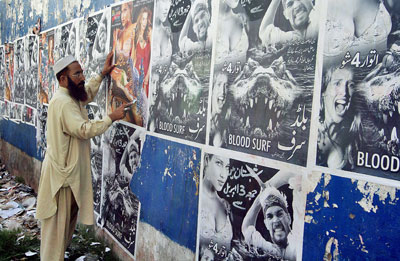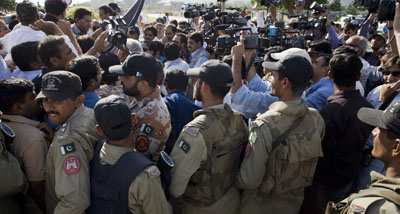
With impunity, more danger ahead for Pakistani press
Pakistani journalists are under threat, and the public is paying the price. The most recent report from the Human Rights Commission of Pakistan includes a detailed chapter on freedom of expression, which ties growing suppression to rising incidence of violence and threats against news media. Not coincidentally, Pakistan sits near the top of CPJ’s Impunity…
A Pakistani ‘sword of Damocles’ in the making?
Given that it is usually punishable by death, “treason” is a dangerous word to bandy about. When it is applied to journalists, it is even more worrisome. We’ve seen that in Sri Lanka, which is in the throes of a backlash against a U.N. resolution on past human rights abuses. (See “Amid Sri Lankan denial,…
Ahmed Rashid on U.S. policy in South Asia
At Columbia University on Monday evening, CPJ board member Ahmed Rashid held forth to a full house in a conversation with Steve Coll about U.S. foreign policy in Afghanistan and Pakistan. If you’re reading this blog, there’s most likely no need to explain who Rashid is–or Coll, for that matter. The earliest reference I could…

Pakistan’s excessive Internet censorship plans
Last month, Pakistan’s government put out requests for proposals for a massive, centralized, Internet censorship system. Explaining that “ISPs and backbone providers have expressed their inability to block millions of undesirable web sites using current manual blocking systems,” the state-run National Information Communications Technology Research and Development Fund said it therefore requires “a national URL…

Threats and menace: Pakistan’s war on words
In Pakistan, the term “a war of words” can take on a menacing dimension beyond the metaphorical. Words–written, spoken, or reported–regularly land journalists in trouble, a very literal, physical sort of trouble. Reporters have become accustomed to being threatened, and over the years they’ve seen threats sometimes build to abductions, beatings, and even death. Such…

Attacks on the Press in 2011: Abolishing Censorship
Even as trade and new systems of communication turn us into global citizens, the information we need to ensure accountability often stops at national borders. New platforms like social media are valuable tools, but the battle against censorship is hardly over. By Joel Simon

Attacks on the Press in 2011: Profiles in Freedom
How does one negotiate the choice to stay and report potentially dangerous news, rather than take a less risky assignment, leave the profession, or flee the country? The recipients of the 2011 International Press Freedom Awards explain. By Kristin Jones

Attacks on the Press in 2011: Evolution in Journalist Security
The danger of covering violent street protests has become a significant risk for journalists, alongside combat and targeted killings. Sexual assault, organized crime, and digital vulnerability are also hazards. The security industry is struggling to keep up. By Frank Smyth
